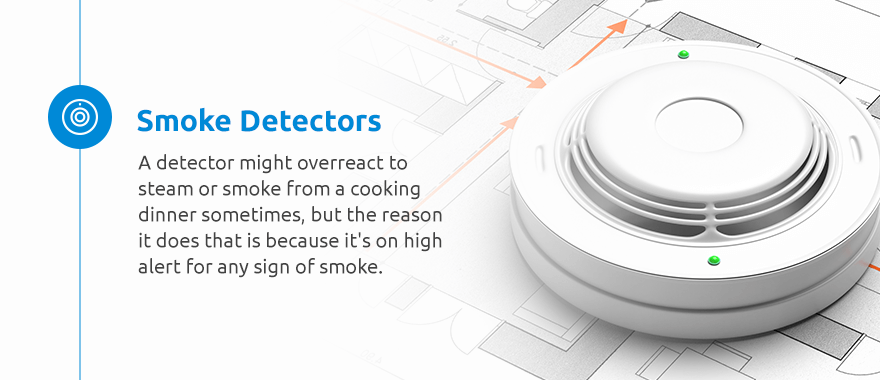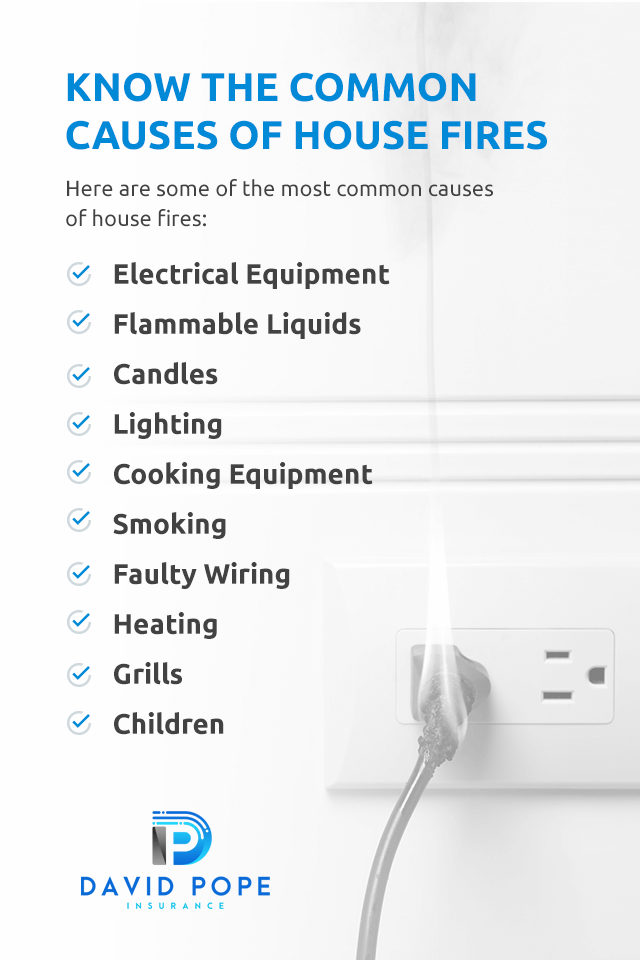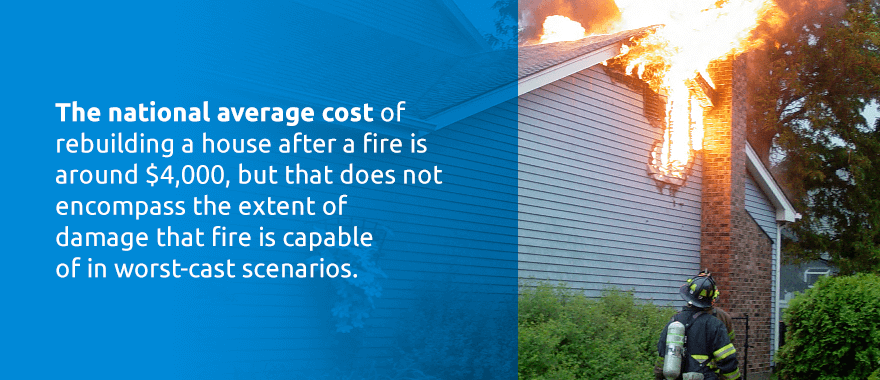Modern innovations have helped homes become safer and more secure from severe damage. You probably don’t spend your time thinking about all the things that could go wrong with your home because it is a safe place. Unfortunately, no home is immune to damage.
Storms, floods and other external forces can disrupt your defenses and leave their mark on your property. Sometimes the source of the damage comes from within the home, like with fires. According to the U.S. Fire Administration, residential fires occur 353,500 times in the U.S. each year.
Working to prevent house fires can help you avoid the consequences and devastation they bring. The following are some good methods of fire prevention for homeowners that you can implement:
One of the simplest fire safety tips is to keep an eye on potential hazards. Train yourself to practice good safety habits when it comes to items that could be fire risks. Don’t leave cooking equipment, grills or candles unattended. Keep lighting and heaters from getting pressed against things they could catch on fire. Don’t smoke indoors. These basic habits can go a long way in keeping you safe.

One of the best weapons you have against house fires is the smoke detector. A detector might overreact to steam or smoke from a cooking dinner sometimes, but the reason it does that is because it’s on high alert for any sign of smoke.
Smoke alarms can notify you the second a fire breaks out, hopefully in time for you to extinguish it before it gets out of control. At the very least, the smoke alarm can give you enough warning to get out of the house safely. Make sure you install and test smoke alarms in your home, and consider interconnecting them all so they go off together. Check their batteries regularly to ensure they are always functioning.
Carbon monoxide can originate from various faulty appliances around the house. As an invisible, odorless gas, it can permeate your home without you having any idea. If a fire starts, the presence of the carbon monoxide will help it spread with remarkable speed. Even without a fire starting, carbon monoxide can act as a deadly poison if breathed in large amounts.
The solution to this issue is to install carbon monoxide detectors around your home, which can notify you if high amounts of carbon monoxide are in the air. Often, these are combined with smoke detectors to form one device. Whether you have combined or separate devices, make sure you have a way of detecting the presence of carbon monoxide.

House fires can seem to sweep in without warning, and they often have an underlying cause that originates within your home. Being aware of these causes in advance can help you know what to keep an eye on, hopefully allowing you to prevent them from starting fires. Here are some of the most common causes of house fires:
Your home likely uses a decent amount of electricity. The vast majority of electrical appliances are safe if used properly. But electrical outlets have the potential to produce sparks, and in some cases, those sparks may land on something flammable and begin a fire. Make sure you investigate anything that looks or smells off when plugged in.
By nature, flammable liquids are prone to catch fire quickly and easily. Whether you store propane tanks for your grill, gasoline for your lawn mower or simply a few bottles of hairspray, you likely have substances like this in your home.
While they’re not a danger when stored properly, you need to know which flammable liquids you have and where you store them. It’s probably wise to keep your tank of gasoline away from any electrical outlets or heat sources, for instance.
An open flame of any kind is a fire hazard, and candles fall into this category. With proper use and caution, candles can be safe and relaxing.
Make sure you position candles away from anything that could catch fire, and stay in the room with them while they’re lit. You should also avoid leaving the house with candles lit. If you’ve positioned them in a safe place, it’s unlikely they’ll catch anything on fire, but you don’t want to take that chance.
While heatless LED lights are becoming more common, the majority of lightbulbs still emit a good deal of heat. If you’ve ever tried changing a lightbulb that’s been on for a while, you know how hot they can get. The glass containers for these bulbs are capable of withstanding the heat, but that may not be the case for the materials the bulb touches.
Make sure the lights in your home aren’t too close to anything they could catch on fire. Ceiling lights are less of a concern, but lamps are riskier. Avoid direct contact between any material and the outside of the lightbulb. Use appropriately sized lampshades, and keep your lamps from being pressed against anything while they’re turned on. Be careful with older Christmas tree lights, too.
Most people have accidentally set off a fire alarm while cooking at least once in their lifetime. It’s easy to brush off these situations and wish the smoke detector would quiet down, but sometimes cooking really can result in something worse than steam and stray smoke.
If you leave food unattended while it’s cooking, it’s possible for it to catch on fire. When your pots and pans are fully heated on the stove, they may be hot enough to set flammable materials on fire. Sometimes the thing catching fire is the food, but other times a hot pan touching the side of a cardboard box could cause it to burst into flame. Either way, you need to make sure you keep an eye on your cooking equipment while it’s in use.
While cigarettes might not produce an open flame under normal conditions, they do maintain an ember-like smolder at the end. That smolder is capable of setting other things on fire if it comes in contact with them. Letting ashes from a cigarette hit your bed or carpet could also start a fire. Smoking indoors may be convenient at home, but it’s not always safe to do so. To avoid house fires, it is safest to smoke outside.
Sometimes fires can get started by faulty wiring inside your ceiling and walls. Since this isn’t something that’s out in the open, you have to look for the symptoms of wiring problems. If you keep having to reset your circuit breakers or notice lights dimming when you use other appliances, you may need to check for faulty wiring.
If you look at a few of the previous items on this list, you might notice two common ways of creating a fire. The first is through direct contact, like with a candle or electrical sparks. The second is via contact with something very hot, like with cooking equipment or lighting.
Heating appliances combine both of these methods. Heaters get hot, so keeping a stack of quilts on top of your heater, for example, might not be the best idea. Since heaters run on electricity, they can also produce sparks, setting things aflame that way. Overall, make sure you don’t keep anything pressed up against your heater.
Any type of cooking equipment can be a fire hazard, but one appliance deserves its own category: grills. Even though they’re kept outside, grills produce actual flames. It’s not uncommon for them to catch food on fire when left unattended. If that fire gets large enough, it can catch nearby objects on fire, including the exterior of the house. Make sure you always keep an eye on your grill while it’s turned on.
Children are very curious, which can lead to them playing with objects like matches and lighters. Keep anything capable of starting fires out of their reach. It may also be wise to childproof electrical outlets, drawers and cabinet doors to keep dangerous items tucked away safely.

Even with home fire insurance coverage, house fires can be incredibly expensive to deal with. The smallest fires that don’t spread throughout the whole house can cost several hundred dollars to repair, but that’s not the most common scenario. More often, they can cost you several thousand dollars. The national average cost of rebuilding a house after a fire is around $4,000, but that does not encompass the extent of damage that fire is capable of in worst-cast scenarios.
For homes without sprinkler systems installed, the average rebuilding cost shoots up to $45,000. In the worst cases, you can end up paying more than $70,000. And those are just the financial costs. They don’t account for the emotional cost of losing irreplaceable items like collectibles or sentimental objects, nor do they acknowledge the possibility of serious injury or death among residents of the home.
If you remain aware of potential hazards and implement good preventative practices, you’ll most likely be successful at keeping house fires from happening in your home. But it’s never a guarantee. Sometimes things still go wrong — outlets spark unexpectedly, smoke detector batteries die right before a fire breaks out or children find the most well-hidden matches.
If a fire does break out, you want to make sure you’re prepared to deal with it. Having a preset plan can increase your chances of escaping your home safely and putting out the fire before it causes large-scale damage to your home. The following are some ways you can prepare for potential fire:
Especially if you have children, make sure your household goes over a plan for evacuating the house in the event of a fire. Go over how to avoid breathing in smoke, how to test doorknobs for heat and what exits to use in what situations. You’ll also want to show your family members where any fire extinguishers or fire escape ladders may be located.
Practice fire escape plan execution so you’re sure everyone understands what to do. You can take the following simple steps to conduct your home fire drill:
If you want to be especially proactive, you can draw up a fire escape plan to put on the wall or the fridge. It’s also a good idea to review the “stop, drop and roll” routine if your clothes ever catch fire.
A simple safety measure to implement is to have a fire extinguisher in your home. When you get a fire extinguisher, it’s important to choose the proper location to keep it in. Ideally, you should keep it somewhere you’ll see it often, so you can easily remember where it is in the midst of an emergency. Also, make sure you keep it up to date — fire extinguishers expire after a certain period of time, so get it replaced when you need to.
Finally, make sure you plan for the worst-case scenario. This could be a house fire you can’t prevent or extinguish, where your focus is solely on exiting the home safely. In these situations, you need to make sure you have a means of financially recovering. Keep a sizable emergency fund set aside to cover your expenses.
Most of all, make sure you’re insured. You’ll feel the financial impact of a house fire no matter what, but with homeowners’ insurance, that impact can be less devastating. Home insurance for fires will help you cover a large portion of the cost, allowing you to get back to normal as soon as possible.

Not sure where to go for homeowners’ insurance? Look no further than David Pope Insurance. We offer homeowners’ insurance throughout the Union, Missouri, area. We’ll work hard to get you the lowest rates on the market, along with the peace of mind that comes with your financial security.
Get a quote today to see your insurance rates, or contact us with any questions you may have!